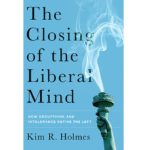Patrick Deneen’s recent article “A Catholic Showdown Worth Watching” is certainly worth reading. According to Deneen, the most important struggle within American Catholicism is a fight among conservative Catholics that pits those who emphasize classical liberal ideals of self-governance and free markets against “radical” Catholics who are suspicious of the ideals of the American founding. The former tend to think that Christianity is compatible with liberalism, whereas the latter insist that liberalism is universally based on a false anthropology and therefore inherently flawed.
If Deneen’s description is accurate, then the fight between Christian liberals and radicals (for lack of better titles) is not worth the time because the radicals are attacking a straw man; they err by over-generalizing. It is true that Christian liberals are sometimes oddly romantic about the founding of America, but it is also true that radicals are oddly critical. Was the founding of America flawed? Of course it was. So were the foundings of all political communities. Real political communities are not “ideas” but historically conditioned associations that arise out of ad hoc historical processes. Of course, ideas matter, but history is not an evolution of ideas. Contra Hegel, ideas and becoming are not the same.
But the really important point is this: the radical school should recognize that many Christian liberals share their anthropology, differ with Locke, and yet affirm liberal norms for government. There is nothing sub-par or incoherent about this stance.
Shared Anthropology Can Result in Different Political Philosophy
Start your day with Public Discourse
Sign up and get our daily essays sent straight to your inbox.Two philosophers may share the same anthropology in general and still differ in detail; they may share similar first principles without sharing secondary or tertiary premises; they may share principles and differ on application. Contrary to what is held by the rationalist tradition of Descartes, Spinoza, and Leibniz, philosophy—especially political philosophy—is not akin to a geometrical system of deductions.
Neither Catholic anthropology nor classical liberalism represents a homogeneous block. For most contemporary Christians who embrace classical liberalism, liberalism is primarily a normative account of the scope of government and law. To be sure, some historically important versions of liberalism rely on self-sovereignty or contract theory, but one may argue in favor of limited government and the rule of law for other reasons. Similarly, one may affirm the naturalness of the family, social interaction, and political community without endorsing the modern bureaucratic state and central planning. In fact, a whole array of options is available to political thought. The radical school misses the nuanced diversity of political arrangements and seems to think that one can deduce only one set of political norms and applications from very general anthropological truths. This approach is heavy-handed and overly general; it fails to respect the importance of political prudence and historical realities.
Many Christian liberals and “radicals” embrace the same anthropology, and few serious thinkers believe that government is neutral. Christian liberalism distinguishes itself by its view of the relationship of government to pre-political goods. One way of defending this approach may be appropriated from the work of John Finnis. According to Finnis, the goods of human flourishing are primarily (but not exclusively) instantiated in pre-political institutions: families, churches, traditional colleges, small businesses, local community, friendships, etc. The primary role of government and law is to facilitate the flourishing of these institutions, not replace them.
Similarly, Christian liberals are attuned to the needs of the poor and the importance of education, but they believe that these should be handled by pre-political institutions except when the obstacles are so great that the only solution is government intervention. They care for local community, custom, family, and religion just as much as their radical brethren do. Nevertheless, like Thomas Aquinas, Christian liberals restrict the practice of government to the political common goods of justice and peace.
In this perspective, human law threatens the wicked, punishes injustice, prohibits outrageous depravities, secures peace, and protects custom. One need not endorse self-sovereignty or social contract theory to embrace this sort of liberalism. Indeed, a desire to limit the scope of government is completely consistent with the Christian recognition of the limits of reason and the fallen character of the human heart. Legal coercion and the threat of punishment curb evil, but laws are still administered by human beings who are prone to evil. Hence, the power of government must remain limited in scope. None of this contravenes Christian anthropology. Rather, it is one way of developing and applying Christian theology and conservative values.
The Real Fight: Classical Liberalism vs. Authoritarian Progressivism
Christian liberals also interpret recent political history differently from “radicals.” Deneen argues that “liberalism appears to be daily more hostile” to Christianity and suggests that the anti-Christian turn of modern governments is the fault of liberalism. But on this point Deneen is simply mistaken. He is right to see anti-Christian hostility on the rise in modern governments, but he is wrong to describe these governments as “liberal.”
Western states have been dominated by illiberal government since the first half of the twentieth century. What threatens Christianity today are governments inspired by authoritarian progressivism. This is an aggressive egalitarian agenda willing to use coercive government and centralized planning to create a homogeneous managerial utopia, governed by an elite cadre of scientists and sociologists, completely planned and dependent, irreligious, without family, tradition, and noble sentiment—a society beyond good and evil. This political force is not liberal but authoritarian; it is cultural Marxism (the same old “new left”) practicing social democracy. And just like previous generations of Marxists, today’s cultural Marxists are committed to freedom in speech, not deeds.
This force directly threatens and subverts the pre-political institutions valued by all conservatives. This is the threat Christian liberals oppose. This is the worthwhile fight.
Of course, “radicals” are perfectly entitled to dispute the wisdom of limited government, although they are likely to endorse the same pre-political values as do Christian liberals. Christian radicals should recognize that their disagreement with Christian liberals is not necessarily about anthropology, self-sovereignty, or social contracts. Rather, radicals wish to emphasize the consistency of Christian commitment and life and to emphasize the non-neutrality of government in the promotion of certain values, Christian or anti-Christian. I am sensitive to these concerns, for the religious impact of government policies is undeniable. Similarly, radicals also insist that just and faithful political life is in part constitutive of establishing the kingdom of God.
These are important claims, and wise and thoughtful Christians have reached different conclusions. However, what is most important is that we realize that these are questions of political philosophy, political theology, and prudence—not necessarily questions that can be exclusively answered by theological or philosophical anthropology. The domains are related but not identical.
Because of the stakes, political debate is often clouded by passion, which tends to obscure real points of agreement. As a result, allies sometimes fall victim to friendly fire. There may need to be a fight between Christian liberals and radicals, but let’s make it a fight worth having.














